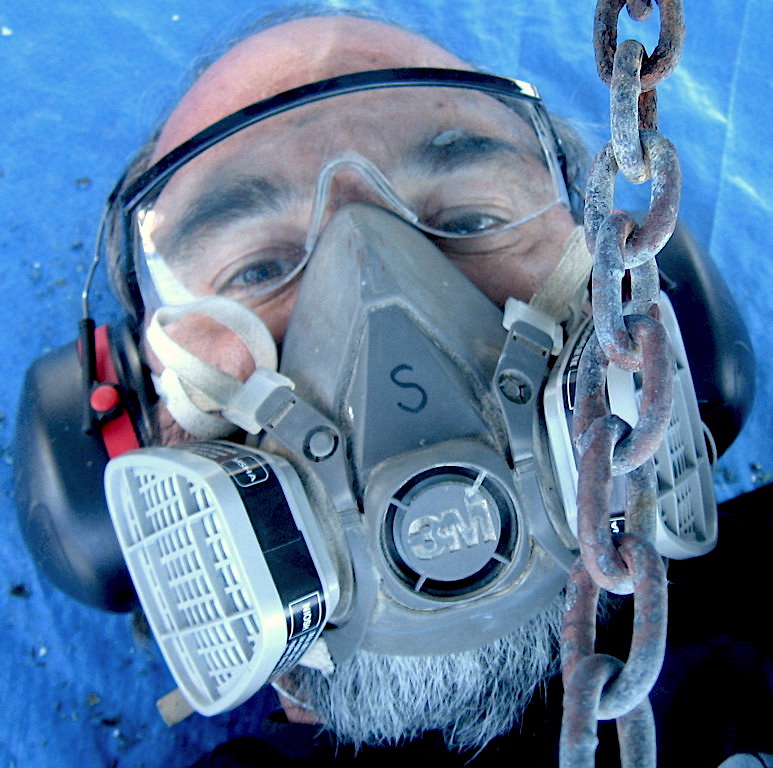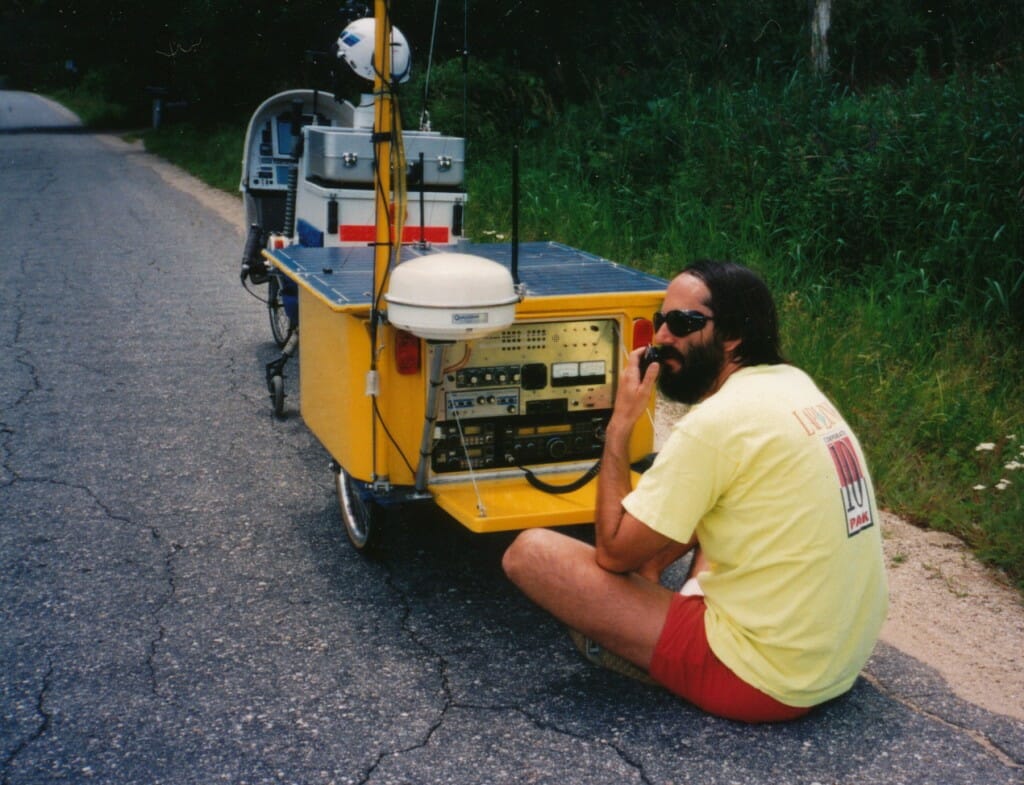
Passion
Above: this selfie while grinding the hull of Nomadness in 2010 seems apropos during the plague of 2020.
Tidal Passion
by Steven K. Roberts
May 1, 1990
I talk often of passion. It’s a driving theme of nomadness, of learning, of life in general — it’s the crystallization of dreams, the lust for evolution, the very antithesis of comfort. Without passion, life is spent waiting… waiting for someone else’s input to make it all seem worthwhile.
With it, growth is a way of life.
Passion is not a notion, or a psychological abstraction. It often appears for a while in association with sex, but that’s not what it’s all about either. Passion is raw and all-consuming, and can’t be replaced with religion, New Age interpretations of experience, academic compartmentalizations of the universe, a romp up the career ladder, or copping an attitude. It’s intense, almost violent; it renders everything else in life unimportant while driving you on a quest of personally epic proportion.
Something like that is not to be taken lightly, especially if you once had it and now sense it slipping away.
The problem is that this whole culture discourages passion — though not overtly, of course. We’re politely encouraged to excel, to invent, to make something of ourselves. But the people who really do so have had to struggle past the boundaries of a society that offers up numbing entertainment, reduces education to the level of homogenization, discourages risk in its corporate world, applauds conformity, treats the exceptional as aberrations, and rewards the “successful” with that spectacularly sanitized mediocrity known as suburban bliss.
There’s an abrupt boundary between the haves and the have nots, as far as passion is concerned. You can’t just dabble in passion — it’s all or nothing. Suddenly finding it makes you resent Christians for appropriating that otherwise delightful term “born again”; losing it makes you feel dead (and in some tragic cases, even take steps to make it so).
No, there’s no such thing as a passion dilettante. Your life is either driven by a grand, magnificent, all-encompassing design… or it isn’t.
What is possible, unfortunately, is to live passionately for a few years then suffer through the agonizing process of watching it slip away — without even knowing whether it’s recoverable. The mind goes, but slowly enough that you witness your own dissolution and understand perfectly well what it means.
What I’m assuming, however, is that passion can be viewed as a tidal, and thus cyclic, phenomenon. It has been in my life, certainly, with every ebb a slow tragedy and every flow an exuberant celebration of new growth. The question is, how can one short-circuit this process and keep passion alive? Could we survive nonstop passion, day in and day out? Is endless passion even possible? If you see it slipping, can you snatch it back?
One way, I think, is with landmarks. For me, it’s a strange mix of favorite road music, an amusing juxtaposition of design concepts, fantasies of prototypical encounters Out There, and a few freeze-frame images of intense romance or adventure etched like lightning flashes on my brain.
Another way to hang on to it is by spending time with passionate people — other mad, driven souls who brave the chortlings of the complacent and fear not the spectre of bankruptcy. It’s powerfully reinforcing stuff, and when you forget your own passion, a spark from someone else’s can reignite the blaze.
Now let’s enumerate methods that don’t work:
Commiserating with dispassionate friends (did you know that The Random House Dictionary defines dispassionate as “free from or unaffected by passion or bias” as if passion were a disease and somehow comparable to bias?)
Making lists of things to do, especially if they represent the intellectualization of something about which you were once passionate.
Perennially reshuffling your workspace, filing systems, business structure, software choices, circle of friends, or choice of town — all in the name of correcting problems that are interfering with your pursuit of the Big Dream.
Waiting for someone else to come along and solve your problems, or, if you’re wealthy, attempting to subcontract your quest.
Praying, drinking, getting stoned, swilling coffee, playing Crystal Quest, stroking crystals, or otherwise engaging in any numbing ritual that by direct effect or superstition is somehow involved with soothing your psyche or warding off danger. (Not that all these things are necessarily bad, mind you, they just don’t have anything to do with passion… even though some of them feel pretty good. Why, one day last year on a coffee buzz I broke 2 million in Crystal Quest and celebrated with a drink!)
Knowing what might work and what definitely doesn’t is useful, but the most important thing is recognizing when your passion is slipping — and stopping it before it’s too late. The trappings and rewards of past brilliance echo sweetly with the magic of days gone by, and it’s blissful to sail on remembered waves if you ignore the fact that you’re not on a boat anymore.
Remember why you are. Life is only once, and slips by so smoothly that you can get away with coasting through a whole career and still look pretty good. Find what you really want. Grasp it with unshakable passion and focused desire.
Everything else is secondary.



You must be logged in to post a comment.